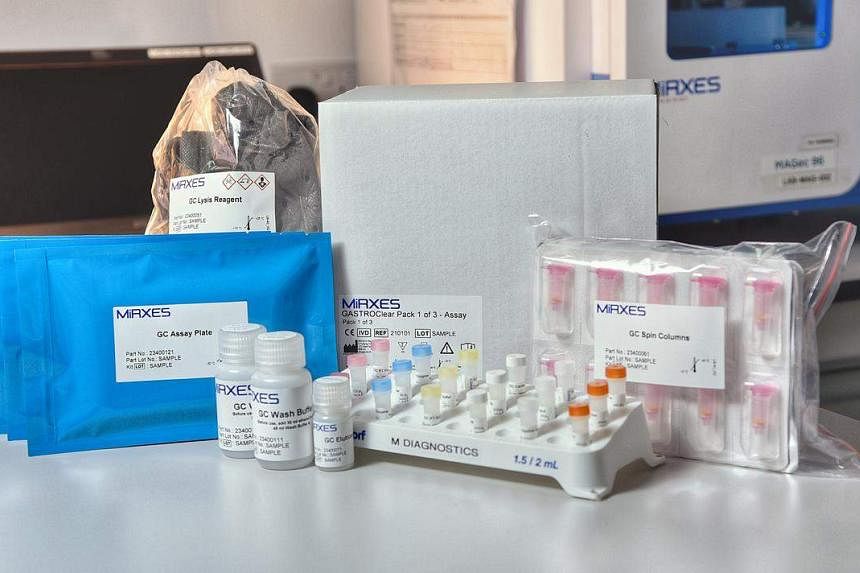SINGAPORE - When Associate Professor Too Heng-Phon was about to start biotechnology firm Mirxes back in 2010, he asked several of his PhD students to join him, but also warned them that it would be tough going.
Two of them decided to help set up the home-grown biotech firm, which went on to develop test kits that use blood-based microRNAs (miRNAs) to serve as biomarkers for early detection of cancers.
Dr Zhou Lihan is now the firm’s chief executive and Dr Zou Ruiyang is the chief technology officer.
Prof Too, the company’s chairman and co-founder, said: “I told them I can guarantee them pain, but I can’t guarantee them success.
“They told me, ‘You know, I need a job anyway. If we fail, we will find another job.’”
The firm had little funding initially to manufacture the kits, which meant the top brass went without wages for a few months during tough times in 2015 to 2016, said Prof Too, who is with the Department of Biochemistry at the National University of Singapore’s Yong Loo Lin School of Medicine.
He said he never planned to start a company.
“We started off because we were curious about how things worked, we did not start with the goal of being entrepreneurs.
“Then we realised what we were doing helped to address unmet needs, which is the use of miRNA in liquid biopsy to help find cancers at an early stage, something which was not heard of at that point in time,” said Prof Too in an interview with The Straits Times in November.
Liquid biopsy is a test done on a sample of blood to look for cancer cells from a tumour that are circulating in the blood. It can also detect pieces of genetic material or DNA from tumour cells.
The first miRNAs were found in roundworms in 1993.
In 2000, scientific adviser Frank Slack from the Harvard Stem Cell Institute in the United States discovered the first known human miRNA, which is a class of ribonucleic acids (RNAs) that play important roles in regulating gene expression.
These molecules help cells control the kinds and amounts of proteins they make, and are extremely small.
Given how new the technology was back in the early 2000s, some scientists were sceptical that the tiny molecules even existed.
Prof Too and his team managed to convince them. In 2002, the team demonstrated a proof-of-concept of their miRNA detection technology at the Yong Loo Lin School of Medicine.
But he knew the best science experiments would still fail without sufficient money. Recalling the early days, Prof Too said the team had to work hard to ensure a sufficient, steady stream of funding.
“Who would invest in things like this? Look at the microRNA scene at that time, we were at a point where many things were not known,” he said.
“We did not have internal funding, and if there were no grants, no research could be done. Nobody wanted to give us money, so by cobbling a bit of money here and there, we slowly did the work.”
It was only after knocking on many doors, and many rounds of rejections later, that Mirxes managed to receive some funding from the Agency for Science, Technology and Research (A*Star) in 2010.
Its aim was to prove that its technology – miRNA-powered detection tests capable of detecting cancers early – was the best in the world.
The first test Mirxes developed used miRNA as a biomarker to test for early-stage gastric cancer. The test kit, known as GastroClear, was approved for use here by the Health Sciences Authority in 2019.
It was the world’s first molecular blood test for early detection of gastric cancer in high-risk populations.

The cancer is usually diagnosed through an endoscopy, a procedure perceived to be expensive and invasive as it involves inserting a thin tube with a camera into the patient’s mouth all the way to the stomach.
Mirxes hopes that with a simple blood test, more people can be screened for gastric cancer early, and begin treatment at an early stage.
In 2014, Mirxes spun off from A*Star’s Bioprocessing Technology Institute, after receiving a grant from Spring Singapore.
More money then started coming in. Prof Too said that in 2015 to 2016, Mirxes had to invest a significant sum in the manufacturing of these diagnostic tools because nobody else was able to help the firm with it.
The manufacturing volume needed at that time was too small and, hence, too costly for Mirxes to approach large multinationals.
“There was nobody to help us then, and Lihan had to make a decision. This decision was scary,” said Prof Too.
“Looking at our bank account, yes, we had some money coming in. But, whoa, we’ll need to invest a significant sum in the manufacturing... If we don’t have the next funding coming in from whoever it is, or whatever we get, we’re going home. We call it a day.
“But if we don’t make that decision, we won’t grow. So we went ahead with the investment.”
With money so tight, the co-founders, Dr Zhou and Dr Zou, decided to forgo their salaries for a few months.
“At that time, Mirxes was just about 30 people... they didn’t tell me that they did not take salaries. Right now, looking back they laugh and say, ‘Yeah, now we take salaries’,” said Prof Too.
“I asked them why they did that, and they said, ‘Look, the other employees have got families, they eat first.’ This was the kind of leadership we needed. Everyone else was paid first.”
The hard work built the foundation of success Mirxes currently enjoys.
In 2021, the firm secured over $100 million in Series C funding to accelerate its push to deliver cancer early detection tests and preventive healthcare globally.
This brings the total amount secured by Mirxes since its inception in 2014 to over $165 million, which marks the largest funding to date raised by a Singapore-headquartered cancer diagnostics company.
The firm also has offices around the world, in countries like China and the US.
It was also reported in June 2022 that the firm was weighing a possible initial public offering, which could raise over $400 million.

On the journey thus far, Dr Zhou said: “Prof Too, Ruiyang and I were accidental entrepreneurs as we never planned to start a company. Looking back, it was simply a natural and necessary step to bring the technology from the bench to the bedside.
“During our PhD training, ‘so what’ and ‘what’s next’ were the two questions we asked ourselves daily to focus our research. After starting Mirxes, we were guided by two other questions, ‘how can our technology make clinical and socio-economic impact’ and ‘how do we scale’.”
He added: “I am proud and grateful to the team and our like-minded partners for building and nurturing Mirxes in the last 3,181 days.
“Looking forward, people, purpose and perseverance continue to be our guiding principles to ensure Mirxes grows as a scientifically advanced, socially responsible and people-centric technology company as we journey towards a world where cancer is no longer a death sentence.”
About Prof Too
Associate Professor Too Heng-Phon received his undergraduate and PhD training in biochemistry at Imperial College before heading to Cambridge for further training and then to Harvard Medical School.
Currently, he is a faculty member in the Department of Biochemistry and NUS Centre for Cancer Research (N2CR) Translational Research Programme at the NUS Yong Loo Lin School of Medicine, and a principal scientist at the Bioprocessing Technology Institute. He was also a fellow of the Singapore Massachusetts Institute of Technology Alliance.
His laboratory was funded by Roche Diagnostics (US and Asia-Pacific) and the National Institute of Health (US).
He has intellectual property protections on specific diagnostic platforms with various departments and with the Massachusetts Institute of Technology in the US.
He is collaborating with a number of clinical groups locally and globally on the discovery and development of microRNA biomarkers.
About Mirxes
Mirxes is a Singapore-headquartered biotechnology company focused on improving and saving lives with RNA-powered disease early detection tests.
In 2014, the company spun off from A*Star to commercialise its technology and develop accurate multi-cancer early detection solutions and make them readily available and accessible to people who need them.


